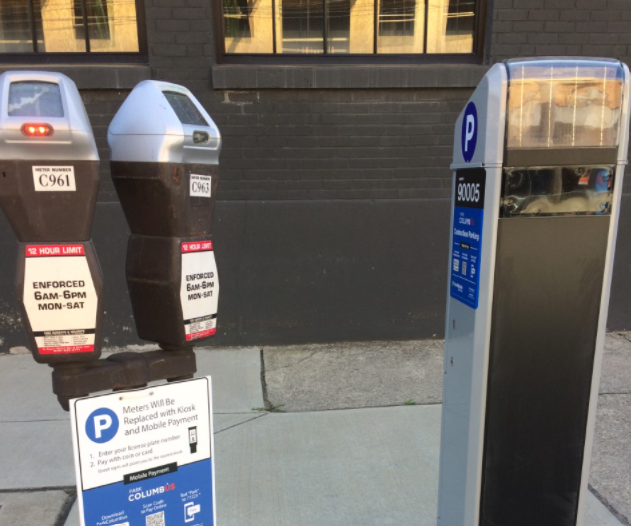Columbus to spend another $250,000 to educate motorists on street parking app, kiosks

Columbus City Council on Monday agreed to pay a local firm another $250,000 to expand a marketing campaign aimed at teaching motorists how to pay for street parking using the Park Columbus signs and app and kiosks that have replaced meters in most areas around the city.
The City Council also held a second reading and gave final approval to revisions to the city code that will require mobile food vendors operating in congested areas of the city like the Short North to cease operating at 2:30 a.m. rather than 3 a.m., effective May 1.
The council authorized the Department of Public Service to modify a professional services contract with Hunter Marketing in Columbus to increase the payment for the "Park Columbus Educational Communications Campaign." Hunter Marketing will collaborate with a city Park Columbus team "with the goal of educating, raising awareness and promoting new mobility and parking initiatives," the ordinance states.
The move means the city will have spent a half-million dollars trying to teach people how to use its new parking system.
The city announced last spring that it would remove meters Downtown and in the Short North and Brewery and University districts in favor of an electronic pay-by-phone app and kiosks, saying it would modernize the system.
Public Service Deputy Director Rory McGuiness said the city has already seen good results from the ad campaign, with parking app usage going from 65% last year to 90% citywide. He said that gives Columbus one of the highest app adoption rates in the nation. Meanwhile, parking complaints on social media are down, he said.
The expanded campaign with Hunter Marketing will also educate the public on how to safely use electric scooters and park them correctly, McGuiness said.
Changes to mobile food vendor laws were compromise, will be reviewed
Council member Emmanuel Remy said the changes to mobile food vendor regulations were spurred by complaints the city received last fall about public safety concerns in the Short North during the early morning hours, some of them resulting from lingering food vendors outside bars.
"When it comes to public safety in any business district or neighborhood, there must be numerous approaches taken to resolve issues," Remy said.
The council said the work on the ordinances had started before Gregory Coleman Jr., 37, died last year after being sucker-punched around 2:30 a.m. on Sept. 5 outside a bar on the 1000 block of North High Street where he had stopped for food at a food cart.
An initial proposal called for ending mobile food vending at 2 a.m., but that was dropped in a compromise to the new 2:30 a.m. last call. And that deadline will be reviewed over the rest of 2023 to see whether any further revisions are needed, Remy said.
"We engaged a lot of people and we made some good compromises, and we'll continue to watch, we'll continue to look for ways to alleviate congestion in the area," Remy said.
Council member Nick Bankston said the ordinance struck a balance between community safety and promoting small businesses like mobile food vendors.
Council spokesperson Nya Hairston said the earlier end to mobile vending hours should reduce crime by encouraging people to go home earlier, clearing congested streets.
All street vendors still must have their vehicles and pushcarts off the public right-of-way by 3 a.m. under the new plan.
The new code gives the city director of public safety authority to designate "congestion zones," where things such as vehicular and pedestrian traffic, parking limitations and mobility issues create a safety hazard. It also gives on-duty and special duty police officers the authority to cite vendors, which could result in various misdemeanor convictions and the revocation of vending privileges.
In other business Monday, the City Council:
∙ Allocated $150,000.00 for the purpose of educating residents about the expanded Columbus Residential Districts, which willl expand the council from seven to nine members with only one member elected from each district beginning with the November general election. However, voters citywide will continue to vote on all council candidates.
∙ Approved a $250,000 grant to the Masters Preparatory Academy, a nonprofit, all-male boarding school for students in grades 7-12, for the support of The Ubuntu Leadership Institute, an educational, leadership, and workforce development program established through a partnership with Ohio State University. The grant is intended to help offer between 75 and 100 rising 9th through 11th grade African American males an "intensive summer development experience."
∙ Paid tribute to 22 women who have served on the legislative body, to coincide with Women's History Month. More than a dozen former councilwomen attended the ceremony in person, billed as a celebration to "acknowledge the hard work, dedication, and trailblazing efforts and accomplishments of women who have served on Council and paved the way for future generations."
wbush@gannett.com
@ReporterBush
This article originally appeared on The Columbus Dispatch: Columbus to spend another $250k educating public on its parking system
